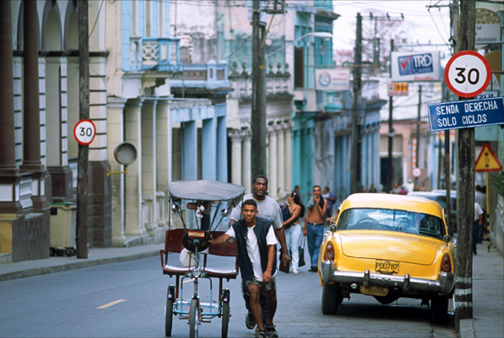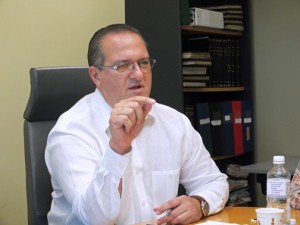Cuba impresses Puerto Rican execs on trade mission

By Doreen Hemlock
Special to News is my Business
Surprises abounded this fall when the 1,300-member Puerto Rico Manufacturers Association sponsored its first official mission to Cuba to learn about potential business opportunities there.
Delegates said they marveled at the strength of entrepreneurship, the weight of foreign investment, the high level of education, and above all, the candor of the Cuban people from different walks of life.
Those Puerto Ricans who had visited the island before were impressed by how much Cuba has changed since President Raúl Castro began picking up the pace of economic reforms in 2008.
“Ten years ago, you could not have seen so many restaurants that are privately owned or so many taxis privately owned,” said PRMA President Waleska Rivera, who had traveled to Cuba several times in the past with other groups. “Now, the country has a marketing plan and they’re sending a message: ‘They’re open for business.’”
In all, 28 delegates took part in the Sept. 22-29 mission, flying via Panama. The group met in Cuba with government officials, academics, farmers, doctors, editors of the Catholic Church-affiliated magazine “Espacio Laical,” and many others during the visit.
Besides Havana, they also traveled to the westernmost agricultural province of Pinar del Río and to writer Ernest Hemingway’s former home near the capital.
One takeaway from the wide-ranging talks, according to Carlos Rivera-Vélez, a PRMA vice-president who’d visited Cuba on a sports trip years before: “Change is here to stay.”
“Some people are suggesting that change should be quicker,” Rivera-Vélez said, in reference to Cuba’s market-oriented economic reforms. “But this is a snowball that has already started rolling, and as it grows, it will become huge. There’s no turning back.”
For now, chances for Puerto Rican business with Cuba are slim. Companies from Puerto Rico — part of the United States for more than a century — face the same restrictions as U.S. businesses to engage with Cuba under Washington’s five-decade-old embargo against the communist-led island.
‘Unlimited’ opportunities
But when U.S. restrictions are lifted, Rivera-Vélez and others see opportunities in Cuba as “unlimited.” They envision Puerto Rican companies selling food and construction materials, building roads and other infrastructure, and becoming active in services ranging from training to management consulting.
A common Spanish language and heritage should spur links between the Caribbean islands that Puerto Rican poet Lola Rodríguez de Tió described years ago as “dos alas del mismo pajaro” — two wings of the same bird.
In addition, modern telecommunications should make it easier to engage at low cost.
“With technology you can do a lot of things without even opening an office in Cuba,” Rivera said.
Still, there are challenges for Puerto Rican business, the visit showed. Cuba’s government faces a cash crunch that limits purchases. State supermarkets, for example, tend to offer little variety and mainly basic products in plain packaging. And consumer items generally cost more than they do elsewhere, thanks to hefty markups aimed at boosting Cuban government coffers.
Marcos Ríos, product manager at Puerto Rico’s veteran Borinquen Biscuit Corp., said he found the price of basic crackers sold in Cuba in simple packaging to run about 50 percent more than the price in Puerto Rico for his company’s high-quality crackers, which come in more sophisticated wrapping.
While his food company could legally sell to Cuba now under a 2000 embargo loophole known as the Trade Sanctions Reform and Export Enhancement Act (TSRA), U.S. law requires that shipments be prepaid.
With Cuba’s cash crunch, it’s unclear what pricing might be. And Borinquen Biscuit would need to work out transport details for a new route, Ríos said.
Selling technology-related products and services from Puerto Rico also seems a more distant prospect, given Cubans’ limited access to Internet and other tech services. Even so, it was the surprising pace of change that most stood out for the Puerto Rican group.
Participants marveled at plans for a new seaport and free-trade zone at Mariel, now being built by Brazilian construction company Odebrecht and financed by Brazil to the tune of $1 billion.
That port, just west of Havana, will be able to handle the megaships that will transit an expanded Panama Canal starting in 2015.
Puerto Rico’s much-touted plans for a $1 billion transshipment hub in the southern city of Ponce have foundered, as the island of 3.7 million inhabitants faces its own financial and political woes.
‘Mom-and-pop’ businesses abound
Delegates also didn’t expect to see so many mom-and-pop businesses in Cuba — which are often run by engineers and lawyers who can pocket more in private ventures than they do earning state salaries.
“And the owners were all so forthcoming about how they’re doing it, how they’re reinvesting,” said Doane L. Hadley, president of BizTech Solutions, who was visiting Cuba for the first time.
“Translating that into larger scale enterprise is the real challenge,” Hadley said. “When we see some large-scale enterprises come in, then we can see a bigger snowball. That’s the hardest part. That’s where the trust comes in, working with the Cuban government and the Cuban government letting them in.”
The PRMA organized its Cuba mission as part of a broader initiative to develop new markets to bolster Puerto Rico’s flagging economy. The island has posted negative or flat economic growth for seven years, prompting an exodus of its professionals.
Organizers recognize that Cuba won’t be a short-term fix. Salaries in Cuba still average about $20 a month — too little to support major imports from Puerto Rico.
“Even though there is a huge movement to a free market in Cuba, it still hasn’t touched the great majority of the Cuban people,” said Rodrigo Masses, the association’s vice-president and coordinator of the trip. “Most people still face difficulties day-to-day, but they are optimistic about the future.”
He added: “We have to keep watching Cuba, to be there for business, when we can.”















